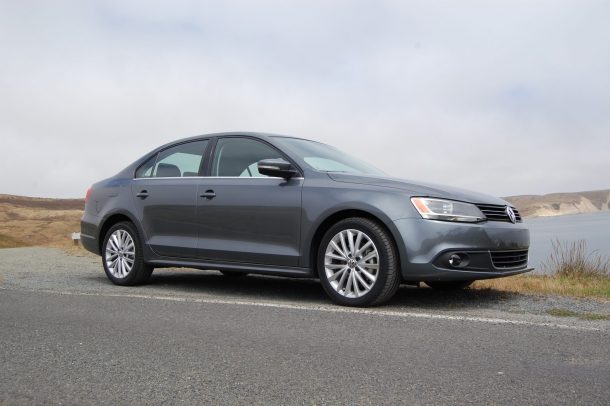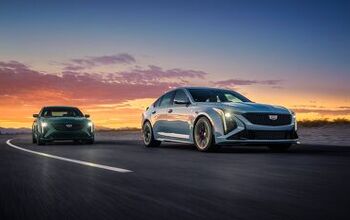Ultra-pricey Fuel Pump Issues Plague Already Tainted Volkswagen Diesels

A problem faced by many Volkswagen TDI owners over the past several years has become a thornier issue ever since the company’s diesel debacle.
North of the border, several owners of 2.0-liter diesel models have turned to the media after high-pressure fuel pump failures turned their vehicles into Teutonic paperweights. The problem facing the owners was unique: to have the automaker buy back their vehicles as part of the emissions scandal settlement, the cars needed to be in running order. No longer covered by warranty, the cost to repair a fuel system contaminated by metal fragments was potentially more than the owners would receive in the buyback.
The burning anger is enough to melt snow.
From Global News comes a tale of two Vancouver cars — a 2010 Golf TDI and 2011 Jetta TDI — and two pissed-off owners, Danny Foster and Peter Gill. Already, the owners are in the awkward position of having bought “clean diesels” that turned out to be massive polluters.
Recently, both vehicles suffered a high-pressure fuel pump failure. Like other owners littering online comment boards, the men discovered a non-warranty repair to fix the pump’s debris-spraying fallout comes at a steep cost. After losing power on the road, both owners had their vehicles towed to a local VW dealership. Foster’s vehicle was 10,000 kilometers past its extended warranty, while Gill’s was 3,000 km past.
The prognosis for both vehicles? A minimum $8,000 repair.
“He says, ‘your high-pressure fuel pump has failed, there’s metal fragments throughout the fuel system and we are looking at a minimum of $8,000 to repair your car,’” Foster told Global News. Hoping to have his emissions-cheating vehicle bought back by the automaker, the owner contacted Volkswagen Canada for assistance.
“It’s just like talking to somebody who says, ‘Sorry, it sucks to be you,’” he explained.
For Gill, who followed the same process as Foster, the outcome was the same.
“I was just being moved around and around,” he told Global News. “Eventually there was a final decision and he said, ‘There is nothing we can do.’”
No repair, no buyback. And no cash. And no car. With nowhere else to turn, the men contacted the media, who then contacted Volkswagen Canada about the two cases. Before long, Foster’s phone rang. It was the automaker.
“I get this call that VW Canada will cover 90 per cent of the repair and the dealership will cover the other 10 per cent,” he explained.
Gill’s phone rang, too. “We’ve reconsidered your application and will cover you for 100 per cent of the cost,” a Volkswagen Canada representative told him.
When asked whether the automaker planned to extend the warranty on the fuel pump, given the circumstances surrounding the buyback, spokesperson Thomas Tetzlaff replied in the negative.
“In the case of the high-pressure fuel pump, we have not seen an unusual failure rate in Canada,” he told the news outlet. “In addition, we have found that the cause of failure is often attributable to outside factors. We will continue to evaluate claims for goodwill repair assistance on a case-by-case basis.”
In the U.S., an investigation by the National Highway Traffic Safety Administration into fuel pump failures in a number of TDI models ended in early 2015 with no recall. The agency fielded 713 complaints about the issue, but closed the book after deciding the matter wasn’t serious.
“Volkswagen believes that misfueling with gasoline is the primary cause of HPFP drivetrain failures in the field,” the NHTSA wrote.
After wrangling with their automaker to avoid a financial loss (to say nothing of the diesel scandal itself), both owners have had it. The final repair bill for Foster’s Golf, now covered by VW, reportedly came in $1,500 lower than when he was on the receiving end of it.
“That trust is broken between me and Volkswagen,” he said. “I’ll be giving them back their car and it will be my last Volkswagen.”
[Image: Volkswagen]

More by Steph Willems
Latest Car Reviews
Read moreLatest Product Reviews
Read moreRecent Comments
- MKizzy If Tesla stops maintaining and expanding the Superchargers at current levels, imagine the chaos as more EV owners with high expectations visit crowded and no longer reliable Superchargers.It feels like at this point, Musk is nearly bored enough with Tesla and EVs in general to literally take his ball and going home.
- Incog99 I bought a brand new 4 on the floor 240SX coupe in 1989 in pearl green. I drove it almost 200k miles, put in a killer sound system and never wish I sold it. I graduated to an Infiniti Q45 next and that tank was amazing.
- CanadaCraig As an aside... you are so incredibly vulnerable as you're sitting there WAITING for you EV to charge. It freaks me out.
- Wjtinfwb My local Ford dealer would be better served if the entire facility was AI. At least AI won't be openly hostile and confrontational to your basic requests when making or servicing you 50k plus investment and maybe would return a phone call or two.
- Ras815 Tesla is going to make for one of those fantastic corporate case studies someday. They had it all, and all it took was an increasingly erratic CEO empowered to make a few terrible, unchallenged ideas to wreck it.


































Comments
Join the conversation
After some help from my local dealer, I got my settlement from VW. VW Claims didn't make it easy, though, but at least I'm finally whole from my Diesel Particulate Filter debacle, $2600 of which half was not covered by "goodwill". I always used Amsoil cetane boost in my diesel-it ran better and clattered less with the fuel treatment. The HPFP had no issues, but I sometimes wonder if that, along with my habit of running all my cars hard up one mountain pass, contributed to the DPF cracking. I wouldn't buy another diesel car in the US, because the fuel isn't up to euro standards. There was some discovery from a class action suit on the web. There were internal VW documents, and they call your car dying "DTF", meaning Drivetrain Failure. Of the cars tested, some had water, a very few had traces of gas; for which there was a recall and installaion of a flap so you could not put a gas nozzle in. This lead to good times when the station you found after searching on Empty had a gas nozzle for the diesel pump...more common that you could imagine. I bought a Truck Sized to Car Sized diesel funnel after this. (Included in Audi cars but not VW...$30 on line, and they even tossed in latex gloves for that eau du Diesel) The real problem is that US Diesel is designed for less mission critical things, like bulldozers......Imagine buying a C7 Corvette and having to use only low octane regular from the shady no-name station. Shell, Mobil and BP diesel were tolerable, Exxon and Gulf not so much. None were good-and we don't get premium diesel in the US market, at least that I could ever find in the NY Metro area.
It took me a couple of moments to understand why ultra-pricey pumps would issue plague. It sounds very plausible for pumps to issue plague, given that it's Volkswagen we're discussing.